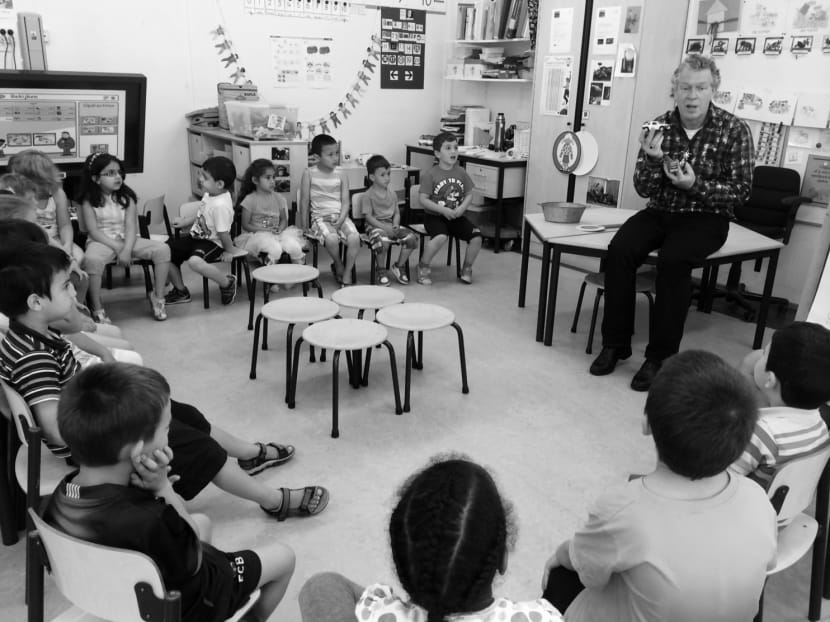Budget: More needed for sandwiched class
Deputy Prime Minister and Finance Minister Tharman Shanmugaratnam has said the focus of the Government Budget this year will be on building on Singapore’s future.

A group of children at a Dutch pre-school. The Budget can embark on a long-term commitment to provide more public spending on pre-school education and childcare. TODAY FILE PHOTO
Deputy Prime Minister and Finance Minister Tharman Shanmugaratnam has said the focus of the Government Budget this year will be on building on Singapore’s future.
To be announced next Monday, the Golden Jubilee Year Budget is expected to build on long-term themes and lay the foundations for the country’s future growth. Singapore’s economic success in the past 50 years has transformed our tiny island state within one generation.
Many Singaporeans have reaped the benefits of the shared economic growth and today enjoy a much higher standard of living than their parents and grandparents.
However, with rising income and wealth inequality, the fundamental basis of sharing our nation’s wealth can no longer be premised on equality, but rather on equity and inclusiveness.
Economic globalisation has not benefited all Singaporeans. Using the Gini coefficient for income only, Singapore’s income gap remains one of the widest in the developed world despite significantly increased government transfers and subsidies in the past decade.
A considerable segment of Singaporeans find the rapid economic transformation and restructuring disconcerting. Over the past few years, to avoid a permanent underclass developing, the social safety net has been strengthened, particularly for the bottom 30 per cent of Singaporeans.
Going forward, more attention needs to be paid to the 31st to 70th percentile of households by income.
Described as the “sandwiched class”, this group of Singaporeans do not qualify for the support schemes meant for low-income households. Yet, they often experience middle-class anxiety: Worried about present needs and what the future holds for the next generation.
THREE WAYS TO HELP THE MIDDLE CLASS
While the threat to jobs looms, stagnant wages are an abiding concern for many sandwiched-class Singaporeans. Helping the middle-class compete and do well in the future must be a key plank of the Budget; otherwise our social and economic institutions could lose their legitimacy and undermine the social compact.
So what can be done for the sandwiched class?
First, the Budget can embark on a long-term commitment to provide more public spending on pre-school education and childcare.
This will be of tremendous value to young sandwiched-class Singaporean families. The key issue is the costs and quality of pre-school education and childcare.
Investing early in our children’s lives is one of the most impactful and beneficial investments a country can make for its future. A growing body of robust research indicates that the returns on these social investments are spread over a lifetime.
Such investments improve school performance, career options and earning capacity while also reducing subsequent expenditures on remedial measures in the area of criminal justice, healthcare and education. There is also the lost opportunity in not developing our children to their fullest potential.
Improving access to high quality pre-school education and childcare also operates complementarily as a form of work support to young parents, especially working mothers.
Knowing that their children are well taken care of enables more sandwiched-class households to make the decision for both husband and wife to work. This can also help reduce our reliance on foreign manpower.
The government should enter the pre-school childcare arena as it has done for kindergarten education to ensure quality and affordability.
Second, the Budget can provide grants and subsidies rather than just income tax relief.
Given that only one-third of the work force pays income tax, many in the sandwiched class would not benefit from income tax reliefs, such as the S$3,000 additional relief introduced last year for enhanced support of parents and grandparents.
Shouldn’t all who support their parents and grandparents receive recognition? The distinction ought not to be whether one is paying income taxes or not.
Third, the Budget must emphatically promote social mobility to tackle inequality, which is inevitable in any society. There is a role for redistributionist policies, such as income taxes, that distribute income/wealth from the rich to the poor.
But they should be kept to a minimum as they harden class distinctions and could degenerate into a debilitating class war between the “haves”, the “sandwiched” and the “have-nots”.
Instead, a paradigmatic shift is needed in our approach to social mobility. The consistent approach is buttressed on equal opportunity, not equal outcomes, and rightfully so.
Yet, this is increasingly inadequate today in an unequal society. Having equal opportunity is wholly different from being able to take advantage of it. Although no amount of state spending will remove the “opportunity gap” among children from different home backgrounds, public policy must ensure that Singaporeans, regardless of their socio-economic standing, are able to take full advantage of the opportunities available to them.
For the sandwiched middle-class, the double whammy of increasing inequality within a stagnating or low social mobility environment could result in declining inter-generational social mobility. This can undermine our meritocratic society if merit is largely confined to a privileged group.
Less social mobility also leads to a hardening of class distinctions, compromising social cohesion.
Social immobility also inhibits efforts to restructure our economy as the societal drive to develop and nurture a deep-seated culture of broad-based entrepreneurship, productivity and technological advancements will be severely stifled, if not extinguished.
As the income and wealth gaps persist, what will prevent two Singapores from arising is to ensure true social mobility and to provide adequate social safety nets that encourage risk-taking while not sapping the work ethic so carefully nurtured.
The health and success of the sandwiched middle-class are fundamental to our nation’s transformational endeavour.
ABOUT THE AUTHORS:
Eugene K B Tan and Goh Bun Hiong are, respectively, associate professor of law at the Singapore Management University School of Law and director of taxes at PKF-CAP Advisory Partners.






